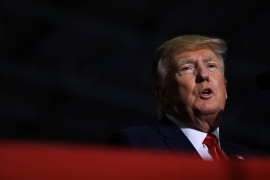
By John Hudak
This November Donald Trump faces an existential test. He has spent the primary season throwing around his political weight by endorsing candidates all over the United States. The midterm elections will serve as a true test of his power, and the outcomes will determine his future strength in the party.
Donald Trump’s record of success in primary endorsements has been mixed, as my colleagues have written extensively about in previous posts. He has padded that record, in part, by offering last minute endorsements—or in the case of the Missouri Senate race with a vague endorsement. Some of Mr. Trump’s endorsements went to candidates who were incumbents or were widely expected to win. In other races such as for governors of Pennsylvania and Maryland and for Senate in Connecticut, Ohio and Arizona, those endorsements were important to the outcome.
Trump’s endorsement strategy is bold—to an extent never before in modern politics he has put his reputation on the line in the midterm elections. But winning primaries is only half the battle. While any politician or former elected official likes to tout a win-loss record (when it is flattering) of their endorsements, the former president faces a second and bigger battle in the general election. In some cases, his endorsements were seen as supporting less electable candidates [i.e., Doug Mastriano (PA-GOV); J.D. Vance (OH-SEN); Herschel Walker (GA-SEN); Mehmet Oz (PA-SEN); Josh Gibbs (MI-03); etc.)
With the sitting Democratic president entering the midterm cycle with low approval ratings, the environment is ripe for Republicans to dominate at all levels of government. Mr. Trump’s endorsement of candidates in deep red states or districts will surely pad his win-loss record. However, if Senate candidates like Walker, Oz, Vance, or Blake Masters (AZ) ultimately lose in numbers that maintains Democrats’ Senate majority, Mr. Trump will be widely blamed. Many expect Democrats to lose their majority in the House. However, if they manage to keep it or if several Trump-backed candidates lose, narrowing Republicans’ potential majority, Mr. Trump will take another hit.
Finally, in governor races, where Republicans could have been or should be competitive in places like Pennsylvania, Arizona, Maryland, Wisconsin, and Michigan, Trump’s endorsements could backfire if Democrats net a pickup in those races. The potential for Republicans to sweep Democrats across the board exists, but it may not ultimately happen, and that possibility is starting to worry Republican strategists. If Democrats hold off historic losses, and especially if they are able to maintain or even expand control in the U.S. Senate, the GOP blame game will begin.
Of course, surprising Democratic strength this November would not be entirely Mr. Trump’s fault. A wildly unpopular Supreme Court decision around abortion (although resultant from Mr. Trump’s Supreme Court nominations), a string of legislative victories, slowing inflation, and sustained job creation all work to bolster Democratic chances. But it’s a midterm and Republicans are supposed to win. If Republicans don’t win, questions about and skepticism of Mr. Trump’s political power and influence will be centerstage in GOP discussions.
Yes, Mr. Trump made himself vulnerable by making endorsements of riskier candidates, bucking the GOP establishment. However, many Republicans endorsed different, controversial candidates in certain races. If election night in November proves underwhelming for Republicans, Mr. Trump’s GOP rivals will pounce. Potential 2024 candidates like Ron DeSantis, Mike Pence, Liz Cheney, Nikki Haley, Larry Hogan, Greg Abbott, and Mike Pompeo are looking for any opportunity to paint the former president as weak, politically ineffective, and as yesterday’s news. The midterms will present the opportunity to label him exactly that. Swarms of GOP voters will continue to genuflect before Donald Trump; others may grow their skepticism about whether he is truly the future of the party.
Thus far, Mr. Trump has already had some luck in head-to-head endorsement fights with his former vice president, Mike Pence. Trump-endorsed candidates bested Pence-endorsed candidates in the Arizona and Wisconsin gubernatorial primaries. (Although, it should be noted in the Georgia governor’s race, Pence-backed Brian Kemp beat out the Trump-backed candidate). However, those “wins” for Mr. Trump reflects precisely his vulnerability in the general election. If Pence-backed candidates are seen as more electable (they likely were) and Trump-backed candidates lose the general, it will be marketed as other party elders being better equipped to pick general election winners than the former president.
Of course, another path exists. That path involves Donald Trump’s endorsements being wildly successful. The dream scenario for the former president is one in which Democratic Senate incumbents in Arizona, Georgia, and Nevada lose to Trump-endorsed Republicans, and Trump-endorsees hold Senate seats in Pennsylvania, Ohio, and Wisconsin. Pair that with a large GOP House majority and flipping governors’ seats in Pennsylvania and Wisconsin, and Donald Trump will look to the Republican Party like a political genius and a powerful kingmaker. If Trump-backed candidates push the GOP over the finish line in terms of control of the Senate and an expansion of Republican control of statewide offices, it will be hard for other Republicans to challenge the former president in his path to the nomination in 2024.
Donald Trump is not on any ballot in 2022, but his political future is. Mr. Trump could have sat quietly in the political shadows during the midterm campaigns, rebuilding his political operation and strategizing a path to return to the White House. Instead, he opted to stay engaged and continue his work of reshaping the Republican Party in his image. The risks and rewards are both significant—an unsurprising wager a man who cut his teeth in big-city real estate would be willing to take. But, ultimately, the midterms will likely either make Donald Trump an also-ran or the commanding force in party politics for years to come.











